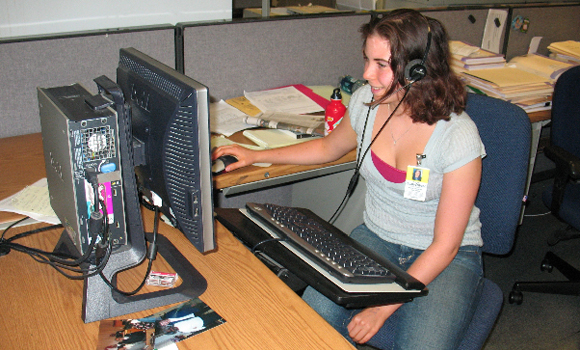| Sun | Mon | Tue | Wed | Thu | Fri | Sat |
|---|---|---|---|---|---|---|
| 1 | 2 | 3 | 4 | 5 | ||
| 6 | 7 | 8 | 9 | 10 | 11 | 12 |
| 13 | 14 | 15 | 16 | 17 | 18 | 19 |
| 20 | 21 | 22 | 23 | 24 | 25 | 26 |
| 27 | 28 | 29 | 30 | 31 |
CATEGORIES
RECENT ENTRIES
BLOG ROLL
Times of her life

“Rachel Cromidas is a Chicago freelance writer.” That’s the author bio that accompanied a January 9 New York Times article about economic development in Bronzeville in the wake of Chicago’s failed Olympics bid. But one detail was missing: Rachel Cromidas is also a 20-year-old undergraduate at the University of Chicago.
The third-year plans to take the spring off to intern full-time with the Chicago News Cooperative, a nonprofit journalism venture that provides local coverage for the Times and launched in late October 2009. UChiBLOGo sat down with Cromidas to talk about Bronzeville, journalism, and the difficulties of taking notes while wearing gloves.
How did you get involved with the Chicago News Cooperative?
The real story is that I ran into [CNC board member and University of Chicago VP for Civic Engagement] Ann Marie Lipinski at the grocery store. I couldn’t find my wallet, so I backed up the whole line. When I turned around to say ‘I’m sorry,’ it was her—and she recognized me as a student interested in journalism. She said, ‘I know you want to be an investigative journalist, and there might be an opportunity coming up. I can’t talk about it yet, but I’m involved in it, and some other Chicago journalists are involved.’ Later [my friend] said, ‘You totally lost your wallet on purpose!’ and I was like, ‘No, I didn’t!’
It was pretty under-the-radar, but since Ann Marie Lipinski had tipped me off, I asked [Chicago Careers in Journalism adviser] Kathy Anderson what it was about. She got me in touch with the editor, Jim O’Shea, and he gave me an internship.
How long have you wanted to be a journalist?
Since tenth grade, when I started writing for a journal of opinion at my high school that some friends had started. I thought, ‘Oh, I’ll write for it,’ because everyone who wrote for it was conservative, and I don’t have very conservative politics. I thought I would give this different perspective. I started reading New York Times columnists, like Maureen Dowd and less inflammatory people like Thomas Friedman and Nicholas Kristof, to get ideas. I ended up really loving their style of writing, and felt like I could mimic it.
Is it ever a struggle to balance your schoolwork and everything else you do?
I love to write, and I write really fast, so I try to take classes with essays and readings. I think I do a pretty good job of managing my time, through keeping really detailed schedules and planning pretty much every hour of my day. I usually don’t feel overwhelmed—or at least I don’t feel more overwhelmed than I’m used to feeling.
But definitely last week, when I was struggling to meet this deadline for the CNC, I really felt like my feet were to the fire in terms of being a full-time student with two jobs, and then living this double life of also being a reporter on a story that needed to get finished. [During class] I would be excusing myself to go to the bathroom so I could take phone calls. I had my phone on silent, but I would keep my phone on my desk so I could tell when it was going off. There was no other way to do it. I didn’t want to miss the first week of classes. I’m hoping now I can keep my priorities on school to get through winter quarter.
What was it like to see your byline in the New York Times?
It was the coolest thing ever. I have for a long time visualized in my daydreams what my name would look like in their nice all caps bold Arial font. I was really anticipating it, even before I thought it was possible I would have something published by the New York Times.
Tell me about doing man-on-the-street interviews in Bronzeville.
It was really cold, and I biked to 35th and Cottage Grove. ... I wore two pairs of gloves, but you can’t take notes with two pairs of gloves on. So I ended up hanging out on the street corner, after the people in Jewel-Osco told me that maybe I should stop interviewing their customers.
And my response was, ‘Well, can I interview a manager?’
You’re going to have a very long and fruitful career in journalism.
[Laughs] Thank you! Honestly, I don’t know how any journalist does any kind of man-on-the-street thing in winter. There just aren’t people on the street, so there aren’t people to talk to. I just waited until I saw people leaving the apartment buildings around the neighborhood and walking towards the shopping plaza or leaving the shopping plaza to walk towards the apartment buildings. There were very few people to talk to, and my hands were very cold, and I eventually took refuge in an auto shop. It was an experience. The whole time, I just I remember thinking, ‘I’m doing this for the New York Times. I will do anything for the New York Times.’
Susie Allen, AB’09
Allen is the senior editor for the College Web site at the University of Chicago.
January 26, 2010
